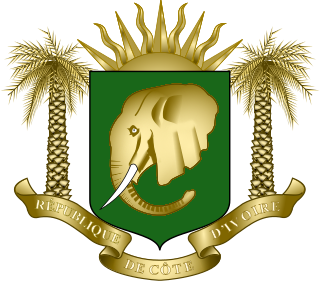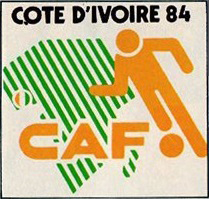
Ivory Coast invested remarkably in its transport system. Transport Infrastructures are much more developed than they are other West African countries despite a crisis that restrained their maintenance and development. Since its independence in 1960, Ivory Coast put an emphasis on increasing and modernizing the transport network for human as well as for goods. Major infrastructures of diverse nature were built including railways, roads, waterways, and airports. In spite of the crisis, neighbor countries still strongly depend on the Ivorian transport network for importing, exporting, and transiting their immigrants to Ivory Coast.

The Armed Forces of Côte d'Ivoire are the armed forces of Ivory Coast.

The Ivory Coast national football team represents Ivory Coast in men's international football. Nicknamed the Elephants, the team is managed by the Ivorian Football Federation (FIF). The team has won the Africa Cup of Nations three times, in 1992, 2015 and 2023, and has qualified for the FIFA World Cup three times, in 2006, 2010, and 2014.

The 1984 African Cup of Nations was the 14th edition of the Africa Cup of Nations, the football championship of Africa (CAF). It was hosted by Ivory Coast. Just like in 1982, the field of eight teams was split into two groups of four. Cameroon won its first championship, beating Nigeria in the final 3−1.

The Gambia national football team represents The Gambia in men's international football and is controlled by the Gambia Football Federation. Until 1965, the team and the country were known as British Gambia. The team has never qualified for the World Cup. In 2021, Gambia qualified for the Africa Cup of Nations finals for the first time in history. The team represents both FIFA and Confederation of African Football (CAF).
The CEDEAO Cup was an international men's football tournament for nations in the Economic Community of West African States. The tournament was held biannually between 1983 and 1991, and may also have taken place in 1977, but few data are known.

Stade de la Paix is a multi-use stadium in Bouaké, Côte d'Ivoire. It is currently used mostly for football matches. The stadium holds 40,000 people. Along with Stade Félix Houphouët-Boigny, it was constructed for the 1984 African Nations Cup. It was one of the host stadiums for the 2023 Africa Cup of Nations, and is currently being renovated for the competition by Mota-Engil, with structures designed by Quadrante Group.
Football is the most popular sport in Ivory Coast. The national team won the Africa Cup of Nations in Senegal in 1992. In 2006 they participated in the 2006 World Cup in Germany. The youth national teams have also done well in world championships, and the clubs from Ivory Coast have won several continental titles. The Ivory Coast national team won a second African cup of nations in 2015.

The first WAFU Under-20 Championship took place in Nigeria. The tournament is sometimes referred to as the Ibori Cup and is contested by countries in the West Africa region.
The WAFU U-20 Championship is an association football tournament that is contested between West African nations. It was funded by The Economic Community Of West African States.
The WAFU Nations Cup is an association football competition that is contested by representative teams of the West African Football Union.

The Gambia women's national football team represents the Gambia in international women's football. It is governed by the Gambia Football Federation. As of December 2019, it has only competed in one major international competition, the 2018 Africa Women Cup of Nations qualification. The Gambia has two youth teams, an under-17 side that has competed in FIFA U-17 Women's World Cup qualifiers, and an under-19 side that withdrew from regional qualifiers for an under-19 World Cup. The development of a national team faces challenges similar to those across Africa, although the national football association has four staff members focusing on women's football.
The Sierra Leone women's national football team is governed by the Sierra Leone Football Association.

The 2023 Africa Cup of Nations, known in short as the 2023 AFCON or CAN 2023 and for sponsorship purposes as the TotalEnergies 2023 Africa Cup of Nations, was the 34th edition of the biennial Africa Cup of Nations tournament organised by the Confederation of African Football (CAF). It was hosted by Ivory Coast, taking place in the country for the second time following the 1984 edition.
Group I of the 2017 Africa Cup of Nations qualification tournament was one of the thirteen groups to decide the teams which qualified for the 2017 Africa Cup of Nations finals tournament. The group consisted of three teams: Ivory Coast, Sudan, and Sierra Leone. The hosts of the final tournament, Gabon, had also been drawn into this group and played games against the other three teams in the group; however, these matches were only considered as friendlies and not counted for the standings.
Group A of the 2023 Africa Cup of Nations took place from 13 to 22 January 2024. The group consisted of hosts Ivory Coast, Guinea-Bissau, Nigeria, and Equatorial Guinea.
The following lists events that happened during 2020 in West Africa.
The 2021 Africa U-17 Cup of Nations qualification was a men's under-17 football competition which decided the teams that would have participated in the 2021 Africa U-17 Cup of Nations.

The WAFU Zone A U-20 Championship is an association football tournament that is contested between competition contested by national teams of Zone A of the West African Football Union. The current champions are Gambia.
This article lists the results of the Morocco national football team from 1990 to 2019.








